- Region
- Águilas
- Alhama de Murcia
- Jumilla
- Lorca
- Los Alcázares
- Mazarrón
- San Javier
-
ALL AREAS & TOWNS
- AREAS
- SOUTH WEST
- MAR MENOR
- MURCIA CITY & CENTRAL
- NORTH & NORTH WEST
- TOWNS
- Abanilla
- Abarán
- Aguilas
- Alamillo
- Alcantarilla
- Aledo
- Alhama de Murcia
- Archena
- Balsicas
- Blanca
- Bolnuevo
- Bullas
- Cañadas del Romero
- Cabo de Palos
- Calasparra
- Camping Bolnuevo
- Campo De Ricote
- Camposol
- Canada De La Lena
- Caravaca de la Cruz
- Cartagena
- Cehegin
- Ceuti
- Cieza
- Condado de Alhama
- Corvera
- Costa Cálida
- Cuevas De Almanzora
- Cuevas de Reyllo
- El Carmoli
- El Mojon
- El Molino (Puerto Lumbreras)
- El Pareton / Cantareros
- El Raso
- El Valle Golf Resort
- Fortuna
- Fuente Alamo
- Hacienda del Alamo Golf Resort
- Hacienda Riquelme Golf Resort
- Isla Plana
- Islas Menores & Mar de Cristal
- Jumilla
- La Azohia
- La Charca
- La Manga Club
- La Manga del Mar Menor
- La Pinilla
- La Puebla
- La Torre
- La Torre Golf Resort
- La Unión
- Las Palas
- Las Ramblas
- Las Ramblas Golf
- Las Torres de Cotillas
- Leiva
- Librilla
- Lo Pagan
- Lo Santiago
- Lorca
- Lorquí
- Los Alcázares
- Los Balcones
- Los Belones
- Los Canovas
- Los Nietos
- Los Perez (Tallante)
- Los Urrutias
- Los Ventorrillos
- Mar De Cristal
- Mar Menor
- Mar Menor Golf Resort
- Mazarrón
- Mazarrón Country Club
- Molina de Segura
- Moratalla
- Mula
- Murcia City
- Murcia Property
- Pareton
- Peraleja Golf Resort
- Perin
- Pilar de la Horadada
- Pinar de Campoverde
- Pinoso
- Playa Honda
- Playa Honda / Playa Paraíso
- Pliego
- Portmán
- Pozo Estrecho
- Puerto de Mazarrón
- Puerto Lumbreras
- Puntas De Calnegre
- Region of Murcia
- Ricote
- Roda Golf Resort
- Roldan
- Roldan and Lo Ferro
- San Javier
- San Pedro del Pinatar
- Santiago de la Ribera
- Sierra Espuña
- Sucina
- Tallante
- Terrazas de la Torre Golf Resort
- Torre Pacheco
- Totana
- What's On Weekly Bulletin
- Yecla


- EDITIONS:
 Spanish News Today
Spanish News Today
 Alicante Today
Alicante Today
 Andalucia Today
Andalucia Today
article_detail
Spanish News Today Editors Roundup Weekly Bulletin July 30
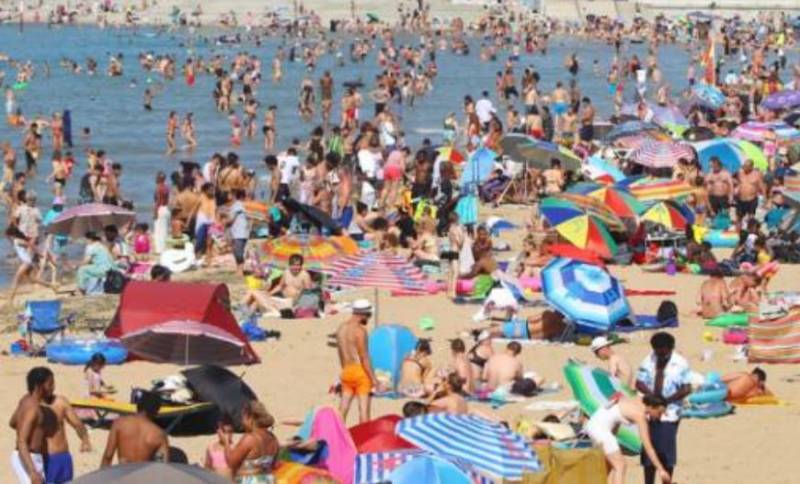
CLICK HERE FOR THE FEATURE ARTICLES "The banned beach behaviours that will land you with a fine in Spain" and "What will the weather be like in August?"
CLICK PLAY NOTE FROM YOUR EDITOR
We’re thrilled with the response level to our bulletin, and your support really does help to finance what we do, reporting on the news and bringing you the most relevant information about Spain. We will be sending out an email in August about renewing your subscription, so please keep an eye on your inbox and your junk/spam folder just in case.
Now: on with the show.
Fire!
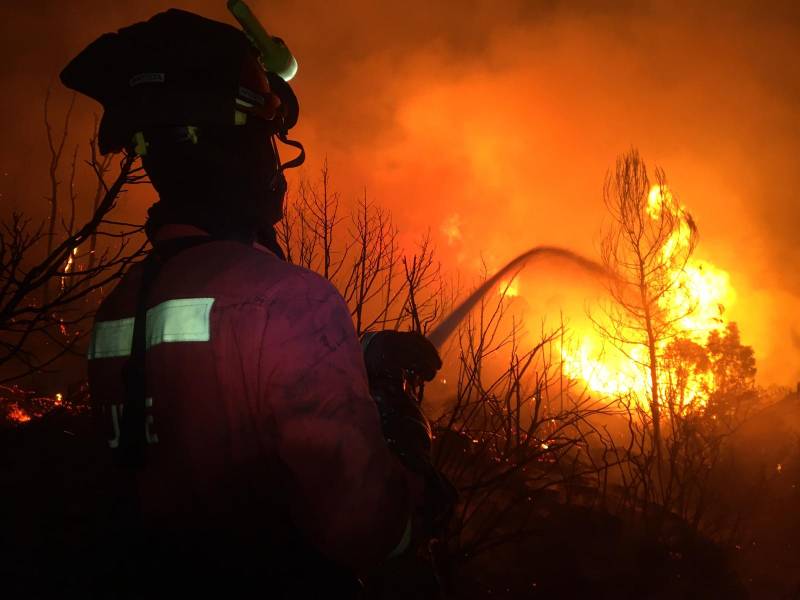
The forest fires are still eating through the Spanish countryside, and just as soon as fire crews put out one, three new ones spring up. In Galicia, Valencia, Murcia, Andalucía, Tenerife… there’s almost no part of Spain that hasn’t been affected by this year’s wildfires, the most destructive ever recorded, having burnt up over 200,000 hectares of forest land already.
That smashes the record for most destructive year for wildfires previously held by 2012, and we’re still only halfway through the summer! Just think of what’s to come… the future looks bright and orange, but not in a good way.
The continuing intense heat doesn’t help, of course. Just this Monday, Murcia reached 46ºC officially (51ºC according to some unofficial accounts), making it the hottest place in Spain. Malaga held that title on Tuesday, but then the temperature dropped by 10 degrees in the space of just 30 minutes thanks to a cool Levante wind. While it cooled down slightly midweek, it’s going to get hotter again this weekend and the weather continues to yo-yo precariously, making the fire situation even more unpredictable and dangerous.
One 55-year-old German arsonist was arrested recently for starting no fewer than six fires in Mallorca, while a Dutch reforestation company working in Aragón was itself partially responsible for a forest fire that destroyed 14,000 hectares.
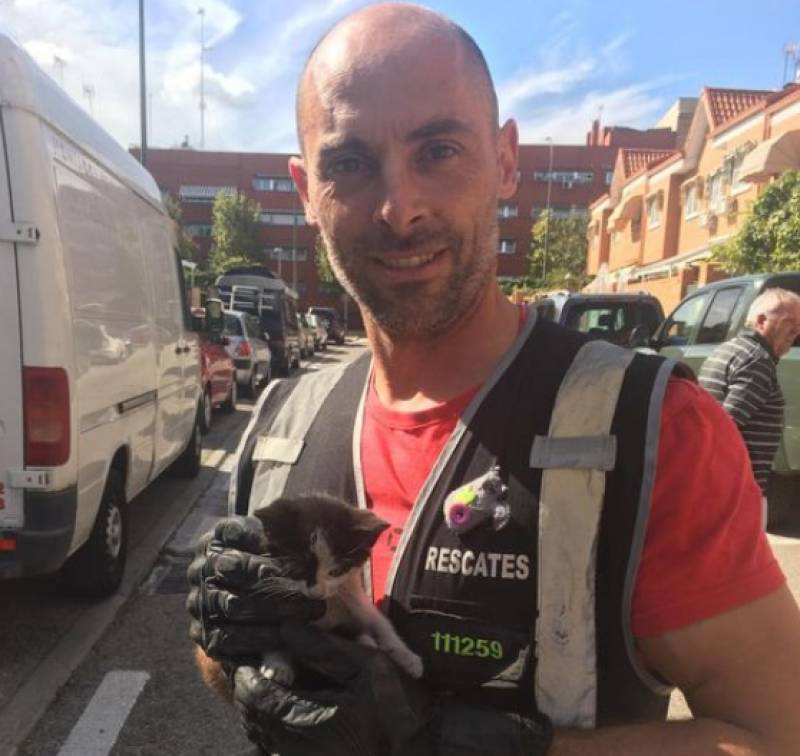 Just when we need as many brave firefighters as possible, one Madrid fireman was sadly killed in a hit and run while cycling on his way to rescue a cat. A dedicated and caring professional who loved animals, tributes have poured in for Alberto, who was knocked down by a driver who sped off rather than stop.
Just when we need as many brave firefighters as possible, one Madrid fireman was sadly killed in a hit and run while cycling on his way to rescue a cat. A dedicated and caring professional who loved animals, tributes have poured in for Alberto, who was knocked down by a driver who sped off rather than stop.But Greenpeace says we’re getting it all wrong when it comes to talking about forest fires in Spain. While firefighters and investigators are doing a great job in working tirelessly to keep us safe, there’s a lot of misinformation out there about how to prevent fires.
For example, the phrase “We have to clean our mountains” is often heard in Spain, but Greenpeace highlights that the country’s mountains aren’t dirty. What’s really needed is a thinning out of flammable trees, scrub and grass in certain areas to reduce the amount of available fuel to feed fires. Similarly, the common myth that forest fires only occur in summer is absurd. Of course, there are more fires in summer but this shouldn’t be used as a justification – as it is now – to disregard the care for Spain’s forests once winter comes.
Sometimes, controlled burning is used to thin out vegetation and actually protect against larger, less controlled fires. But while it is populist to tout such methods as a panacea, the truth is that controlled burning should only be used under very specific circumstances, and in general we have to find new, more environmentally friendly ways to prevent the scourge of forest fires each year.
Also, repopulating forests after a fire isn’t as easy as just throwing some seeds down. We need to select the most appropriate native species for any given area, to protect against wildfires all year round.
The most shocking thing for many, though, is how and why anyone would deliberately start one of these fires. They destroy homes. They burn up animal habitats. They put the lives of firefighters and innocent citizens in danger. They contribute to more global warming, in turn making the heatwaves worse and increasing the risk of further fires.
Anyone can be guilty of leaving a glass bottle on the tinder-dry forest floor by accident; it’s sad and silly, but it could happen. But to go out with the intention of starting a fire that you know will harm thousands of people? It takes a sick mind…
Un-bar-lievable
We’ve long been led to believe that Spain offers more value for money than home, and eating out and having a bevvy or two is definitely cheaper, right?
Maybe not, or at least not in Madrid as one disgruntled customer pointed out this week, going viral on social media in the process. The penny-pinching tourist was astonished at the “rip-off” he’d experienced in one high-end city centre bar, being charged 44 euros for three mojitos.
His outrage almost broke the internet; his post caused serious controversy, and quickly went viral with many users agreeing that 44 euros is a bit on the steep side for three drinks. However, just as many sided with the pub, arguing that the customer chose to patronise a bar in the centre of Spain’s capital and should have expected to pay a premium.
The lesson is surely that it’s best to do your homework, especially if you’re visiting a big city.
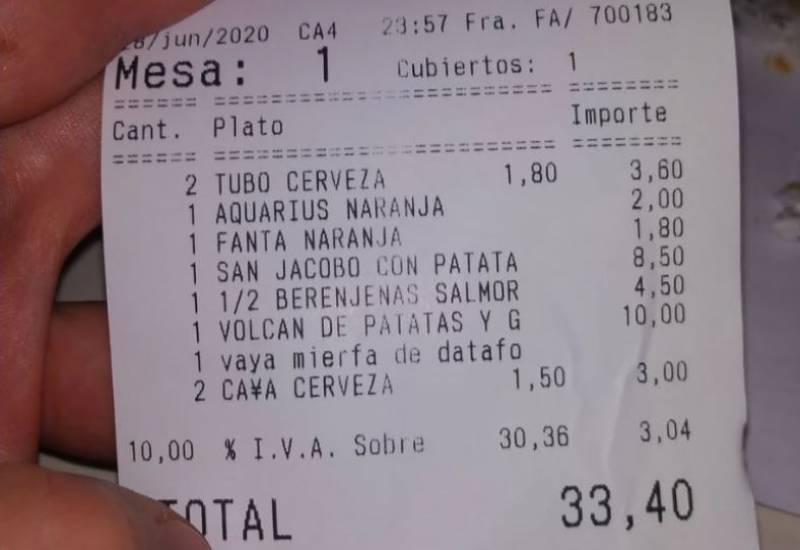 Perhaps he should count himself lucky that he was actually able to read his bill, unlike another befuddled patron of a bar in Cordoba, who wasn’t so much shocked at the cost of his night out as the almost undecipherable charge on the receipt.
Perhaps he should count himself lucky that he was actually able to read his bill, unlike another befuddled patron of a bar in Cordoba, who wasn’t so much shocked at the cost of his night out as the almost undecipherable charge on the receipt.The customer of the pub in question had a few drinks and a bite to eat with his group. All appeared to be present and correct as he scanned his bill, which came to 33.40 euros: a few soft drinks, a couple of beers, some tapas and… ‘what a crap card machine’.
The patron didn’t have a clue what the cryptic message – in dodgy Spanish, ‘vaya mierfa de datafo’ – was supposed to mean. Was the owner or a staff member trying to communicate with him? Was it just a garbled computer glitch? Could the bar’s card machine really be that bad?
Completely baffled, the customer posted a copy of the receipt on Twitter and it went viral within a few hours, garnering several thousand likes and dozens of comments, most from people who were equally confused about the receipt’s message.
Nobody has even come close to figuring out the secret of Cordoba’s crappy card machine and it remains a secret to this day, but as one helpful Twitter user pointed out, at least there was no charge for it.
To beach or not to beach
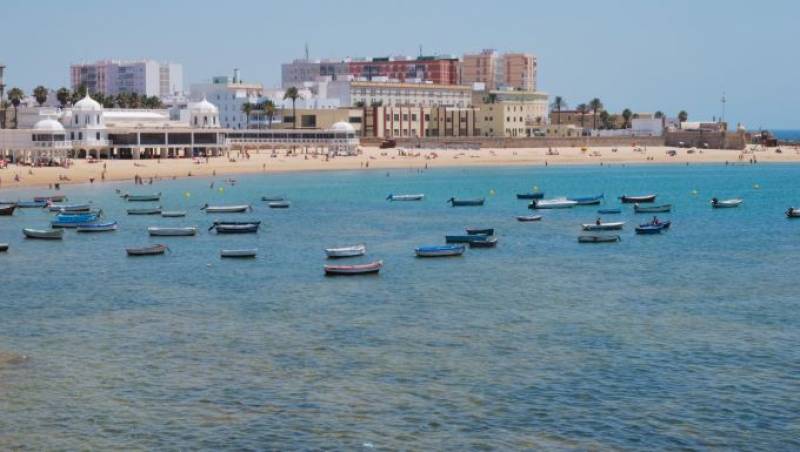
For many in Spain, whether expats who have relocated to the country permanently or those who just come over for a holiday, the most charming part of their stay is the beach. Being near a sandy, sunny beach and getting to enjoy the chance to sunbathe or swim in Spanish waters is something we never take for granted.
But it’s worth bearing in mind the dangers that can occur on the beach in summer, and make sure you know all the rules to avoid being fined, injured or worse.
From the Costa Brava to the Costa de la Luz, Spain has some of the most pristine coastlines in the world, but it takes a lot of work to keep them that way, and several communities have implemented strict rules on beach etiquette with fines of up to 1,500 euros for those who flout them.
Smoking is banned on many beaches in Spain, with Barcelona being the most recent city to prohibit lighting up on the sand just this week. The city council has even hired ‘informants’ to scour the sand for rule-breakers and fine them on the spot if caught smoking.
On many beaches, especially in the summer season, dogs and other pets are forbidden from being on the sand. This includes on Cartagena beaches in the Murcia region thanks to a recently passed ordinance, but after public outcry this will not apply to the promenade, and dogs will still be allowed to walk along the prom.
Camping, urinating in the water and reserving a spot on the sand with a towel or umbrella and then walking away are all prohibited and can land you in hot water on various beaches in Spain – in some cases in more ways than one.
Of course, authorities can’t legislate against everything, and there are some bad beach behaviours that they just can’t predict, such as what has happened recently in Tarragona, near Barcelona. A shipwreck of a sailboat which has been stranded just off the shore of Coma-ruga beach for about a month now has become a dangerous playground for some beachgoers, who have been throwing themselves off the bow, despite its deteriorated state.
The owner of the vessel has heavily criticised the city council, claiming he hasn’t been given any help to refloat his grounded boat, which is being pushed further and further into the sand by the antics of wannabe daredevils using his property as their private toy. In addition, the boat is becoming increasingly hazardous with sharp edges and rusty ironwork, and the cabin has been stripped bare by thieves, despite being half submerged in the water.
Then there are the animals which pose a risk on Spain’s beaches. In Cadiz, beaches are being plagued by a reappearance of the venomous greater weever fish – better known to the Spaniards by the dramatic and evocative names ‘Pez araña’ or ‘Pez escorpión’ – the Spider fish or Scorpion fish. These fish, which hide in the sand and cause several poisonings each year when people step on their venomous dorsal spines, are becoming more common in Cadiz as the Atlantic Ocean warms up. As a result of the heatwaves, At the moment, marine temperatures are exceeding 30ºC in certain coastal points, which is around 6 or 7 degrees higher than normal.
But without a doubt the most dangerous part about being on the beach in Spain – or in the swimming pool, for that matter – is the risk of drowning. The latest statistics released this week by Spain’s National Statistics Institute (INE) – on the occasion of World Drowning Prevention Day, no less – show that 406 people died from drowning in Spain in 2020 and 461 people were hospitalised in near-drowning incidents. Shockingly, this means drowning was the third leading cause of death in the country due to external or accidental causes in 2020, and judging by the recent spate of cases it wouldn’t be a surprise if this was the same or even worse in 2021 and ’22.
In Murcia, an elderly woman died last Sunday whilst bathing at Castillicos beach in Santiago de la Ribera, while just hours earlier a 17-year-old sustained serious head trauma after plunging into shallow water and smashing his head when he jumped off a cliff into the sea at Cabo Flores in Cartagena. In Alicante, an 80-year-old man died from heat stroke on El Campello beach there were near-drowning incidents involving two more elderly men at beaches in Benidorm and Torrevieja.
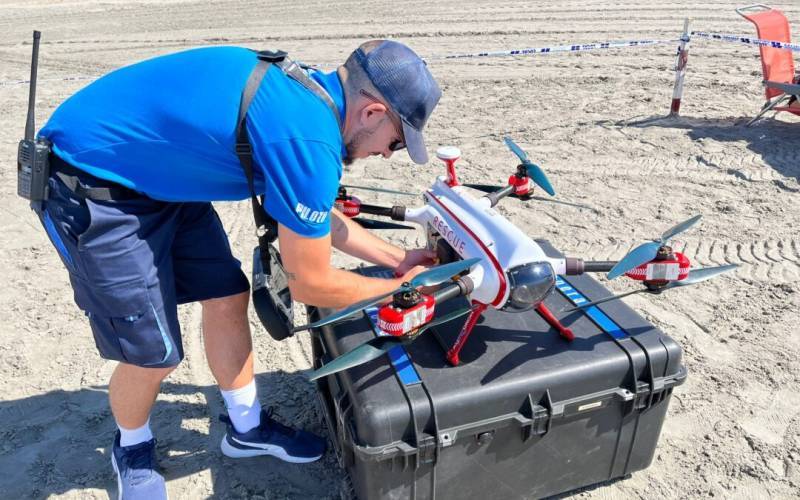 One Spanish city is taking the fight against drownings seriously, and is using modern tech to help. Alicante City Council is adopting state-of-the-art technology in an attempt to prevent drownings, and beach safety is being stepped up with a drone at Playa de Santa Pola which will speed up critical response times in the event of an emergency.
One Spanish city is taking the fight against drownings seriously, and is using modern tech to help. Alicante City Council is adopting state-of-the-art technology in an attempt to prevent drownings, and beach safety is being stepped up with a drone at Playa de Santa Pola which will speed up critical response times in the event of an emergency.Councillor for Beaches, Angel Piedecausa explained: “The drone has two life jackets which, if necessary, can be launched to bathers in situations of risk. In addition, the drone coordinates daily with the Lifeguard and Rescue services to act in case of any emergency.”
Murcia
You may remember that Murcia International Airport recently changed its name. What was commonly known as Corvera airport, or simply Murcia airport, took on the decidedly less wieldy moniker of the Region of Murcia-Juan de la Cierva International Airport last month. Regional forces felt this was an incredibly vital move for which they had been fighting for a long time. An unbreakable campaign promise. A life-changer for many people travelling to and from Murcia.
Now, though, in the latest chapter of this saga, the central Spanish government has taken the Murcia government to court over the name change. The reason? While its true that Juan de la Cierva y Codorníu, the man the airport is now named after, was a prominent Murcia engineer and inventor of the gyroplane, he may also have links to the coup d’état carried out by Spanish dictator Francisco Franco in 1936, which led to nearly 40 years of fascist rule in Spain.
To glorify such a man, says the government, would go against the Historical Memory Law, which aims to ensure the rights of those persecuted during the dictatorship years and preserve a firmly anti-fascist stance in all of Spain. Mr de la Cierva’s descendants counter that when people think of dear old Juan, they think gyroplanes, not Franco. Dirigibles, not dictators.
 What seems inevitable is that this issue will be fought in the courts between the national and regional governments, probably at no small expense to the taxpayer. And in the meantime, most people could give two figs about what the airport is called and what they really want are more and better transport links in the Region. That money would be better spent reviving San Javier airport than paying lawyers and changing all the airport signs.
What seems inevitable is that this issue will be fought in the courts between the national and regional governments, probably at no small expense to the taxpayer. And in the meantime, most people could give two figs about what the airport is called and what they really want are more and better transport links in the Region. That money would be better spent reviving San Javier airport than paying lawyers and changing all the airport signs.Thankfully, it looks like someone up there might have some sense as the Regional Mobility Minister announced this Friday that there will finally be a bus service from the Mar Menor towns like Los Alcázares and San Pedro del Pinatar to Corvera Airport, but there was no indication of when that would come to pass. Unlikely to be this summer, at any rate, and after the summer season ends they will probably say there aren’t enough flights to make it a viable option.
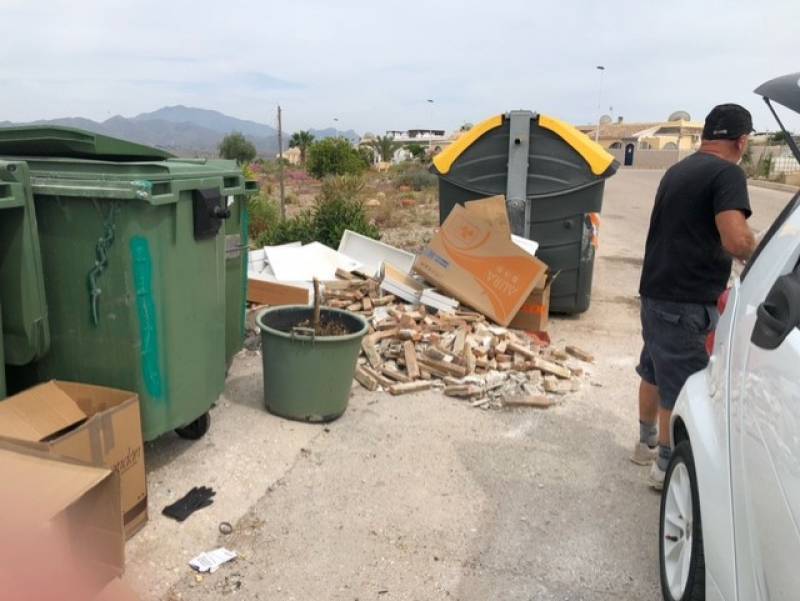 Blessedly, at least there does seem to be one community getting it right, as Camposol 2025 and other groups from Camposol Sector D are working with Mazarrón Council to tidy, organise and reconstruct an important recycling and refuse point. Together, with the help of the whole community, the recycling and household refuse collection point on Calle Esparraguera has been cleaned up and put on a new extended concrete plinth in a bid to stop people dropping large household items around the area in what effectively amounts to fly tipping.
Blessedly, at least there does seem to be one community getting it right, as Camposol 2025 and other groups from Camposol Sector D are working with Mazarrón Council to tidy, organise and reconstruct an important recycling and refuse point. Together, with the help of the whole community, the recycling and household refuse collection point on Calle Esparraguera has been cleaned up and put on a new extended concrete plinth in a bid to stop people dropping large household items around the area in what effectively amounts to fly tipping.Finally, a community-led initiative to spend money from the public purse and actually make people’s lives better with things they care about, and not use it to squabble over silly things like what to call the airport.
There’s loads going on in Murcia this summer. Check out our EVENTS DIARY for some ideas of what to do:
Spain
It’s fair to say one of the biggest draws of Spain is the weather and mother nature has certainly pulled out all the stops for the sun worshippers among us this summer. It began with one of the earliest June heatwaves on record and now July is coming to a close with yet more extraordinarily high temperatures.
There is little reprieve in sight either, according to meteorologists, who have indicated that the current stifling episode could be but a glimpse of what awaits us next month, since August is likely to be dominated by more extremely high temperatures, although instability and heavy summer storms will certainly feature in parts of the country.
For those hoping to jet off to Spain for some summer sun, there’s both good and bad news. Just as the latest round of Ryanair strikes are coming to an end, the unions representing the airline’s cabin crew in Spain have announced a new barrage of work stoppages: staff now plan to strike every week between August 8 and January 7, 2023, downing tools from Monday to Thursday.
The general secretary of the USO union at Ryanair, Lidia Arasanz, stated that they were “forced” to reconvene new days of strike action due to the “impassivity” of the company for not listening to its workers and preferring to leave thousands of passengers on the ground “before sitting down to negotiate an agreement under Spanish law.”
As well as reinstating the salary rates that were being paid pre-pandemic, the unions are demanding 22 days of annual leave for cabin crew as well as 14 public holidays.
That’s the bad news… the good news is that, so far at least, the strikes haven’t caused nearly as much disruption as was initially feared. In fact, on the last day of this round of work stoppages, Thursday July 28, not a single flight was cancelled, although almost 30 were delayed, and Ryanair itself claims that less than 1% of journeys have been hampered.
The end of July is upon us and what it looks like bringing is more broken promises and disappointment, at least if you’re a British driver in Spain. The driving licence exchange saga has been dragging on interminably, but ambassador Hugh Elliott hinted last month that an agreement to get holders of UK licences back on the road should be forthcoming before August.
Now, unless there is an eleventh-hour deal, that doesn’t look like it will happen.

Since May 1, Brits with residency status in Spain for over six months and who use British driving licences have been forbidden from driving, but the British Embassy in Madrid has vowed that very shortly, Britons should once again be able to exchange their UK driving licences for Spanish ones and drive using their British licences for a period of six more months.
However, August is traditionally the summer holiday month for many Spaniards, and a lot of public institutions close down or drastically reduce their opening hours, and so the prospects of a deal being reached before September now seem dim.
Nevertheless, an eternally hopeful Hugh Elliott has assured that “the UK’s ambition is to reach a deal as soon as possible”.
Alicante
What should have been the start of a dream holiday in the sun for almost 150 holidaymakers quickly turned into a terrifying nightmare after each and everyone aboard a flight from Italy to Alicante were sent macabre images and death threats. Just before the Vueling flight VY1367 took off and was still waiting on the runway, mobile phones throughout the cabin pinged and 147 passengers opened their mobile phones to find sinister messages in Amharic, a language spoken in the north of Ethiopia.
In addition to chilling death threats, an attachment contained morbid images of skulls and grisly figures from a horror movie. “Your family will bleed for your deeds, you will suffer eternally for your deeds,” read the message. The captain immediately suspended the flight’s departure and the Border Police were alerted. The authorities identified an 18-year-old Spaniard on board who was arrested for causing alarm on a passenger plane after admitting to sharing the terrifying message via Apple’s “Airdrop” service.
In Benidorm, what must have been an extremely alarming two days was finally brought to an end for the family of a 76-year-old British man who disappeared only to be found 48 hours later just 500 metres from where he had last been seen.
A search party on land and in the air was activated after the Brit was reported missing and following an anxious two days, the pensioner was found near Aqualandia water park with several injuries on his feet caused by walking barefoot and wandering in the bush. He was also suffering from dehydration. It’s still unclear why the man wandered off and was unable to find his way back again, and he may have been disoriented.
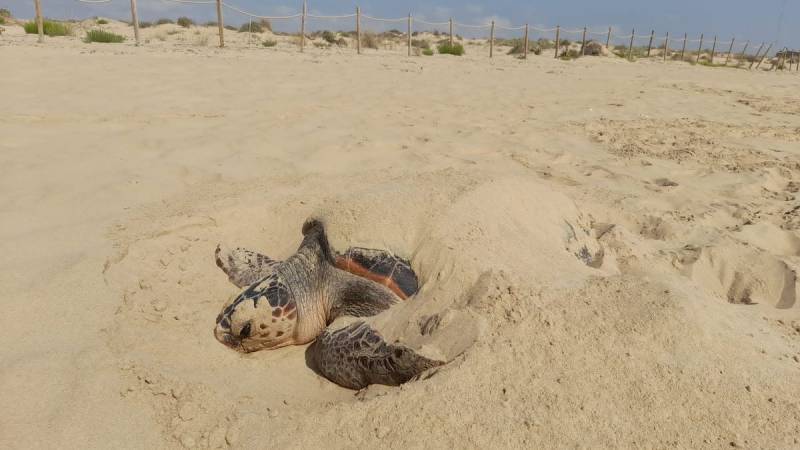 In incredible and heart-warming scenes, conservationists shared images of a nesting loggerhead turtle discovered half-submerged in the sand at Ortigues Beach in Guardamar del Segura. Astonishingly, the large female turtle had laid 130 eggs, the largest number of all the nests registered in the Valencian Region, and is expected to lay more over the next fortnight.
In incredible and heart-warming scenes, conservationists shared images of a nesting loggerhead turtle discovered half-submerged in the sand at Ortigues Beach in Guardamar del Segura. Astonishingly, the large female turtle had laid 130 eggs, the largest number of all the nests registered in the Valencian Region, and is expected to lay more over the next fortnight.Another vulnerable loggerhead turtle narrowly avoided certain death thanks to the intervention of maritime rescuers after becoming trapped in illegal fishing gear – the biggest threat to Caretta species’ populations. A Guardia Civil Maritime Service boat carrying out surveillance work near Tabarca Island in Alicante spotted two plastic bottles floating on the surface of the water attached to a line of plastic thread, and quickly noticed the submerged turtle with one of its flippers caught up in the illegal fishing buoy, preventing it from swimming and feeding.
Holding the creature by its shell so as not to damage its limbs, they lifted the loggerhead onto the boat and managed to free it from the line. The animal is now recovering at the Oceanogràfic Foundation’s facilities in Valencia so that it can be released into the wild once again.
The Vega Baja is an area of high seismic activity and whilst earthquakes are not unusual, they are normally considered minor and it’s not so common for tremors to be felt in neighbouring towns. But this was the case this week when a small earthquake measuring 1.6 on the Richter scale was recorded in the south of Torrevieja and was felt by residents in Orihuela Costa and San Miguel de Salinas. Fortunately, there were no reports of personal or material damage.
Andalucía

On top of the welcome news a couple of weeks ago that railcards for medium-distance train journeys would effectively be free between September and December, Andalucía has recently announced improvements to the inter-province railway line.
The new changes, which could have a budget of close to 1 billion euros, will essentially mean a reduction of the journey time between Almeria and Granada to just an hour and a half, and of the Almeria-Seville train journey to just three and a half hours.
Admittedly, the project will probably not be fully completed until 2030, but in the meantime rail passengers should progressively see improvements to journey times as each section of the trainline is overhauled.
Better to travel by train in Almeria than by bicycle, say some, after the horrendous incident which left two cyclists dead this week when a drunk driver ploughed into them. The crash happened at around 9.40am last Sunday, when the 24-year-old who was four times over the legal limit for alcohol veered into the oncoming lane at speed on a bend at kilometre 7 of the AL-4200 road in Níjar, careering into three cyclists, killing two and wounding the third. The driver has been sent to jail.
Two people who have avoided jail are a couple of Estepona cops who were found guilty of raping an 18-year-old back in 2018, but will only need to do a sexual reeducation course and pay 80,000 euros in damages to the victim. The horrible abuse of power happened when officers went to the girl’s house after stopping her boyfriend for drink-driving. The boyfriend was not at home with her, just her flatmate, and they proceeded to force her to take cocaine, undress her and have unprotected, non-consensual sex with her with her friend ran to get help. Prosecutors requested a sentence of 33 years in prison for each of the policemen, who were later sacked, but in the end the pair won’t serve a minute behind bars.
Finally, two warring factions on a nudist urbanisation in Vera, Almeria have stepped up hostilities and hired private security firms to protect their rights after around 80 of the 500 homeowners – shockingly – walked around fully clothed in public areas. The naturists claim this is against the community rules and have contracted the security services to make sure nakedness is enforced, or else evict the non-conformists. The “textiles” (as the non-nudists have been named) hired their own security, and now members of the two security firms have come to blows in defence of their employers’ rights to wear and not wear clothes. Presumably the security people aren’t nude, though, which kind of negates the nudists’ point. Whatever next?

You may have missed…
- Hollywood A-Lister Matt Damon enjoys Spanish break in Javea on the Costa Blanca.
Meanwhile, movie fans in Javea have been treated to various sightings of Hollywood A-lister Matt Damon, who has been holidaying in the area with his wife and has family ties there. - Two OAPs caught having sex in a public park in Spain.
Police in Zamora had to break up a very public display of oral sex between two elderly people after several complaints. - How to tell the temperature in Spain from the song of the crickets.
The chirping of crickets is surely one of the sounds most synonymous with summer, but these interesting insects can also help us gauge the temperature quite accurately. - Immigration reform in Spain will enter into force on August 15.
Spain has signed into law its Immigration Regulations reform, which aims to make it easier for foreigners to enter into the labour market. - Virus outbreak infects 96 people in Almeria hotel.
Almería is investigating an outbreak of gastrointestinal infection in a hotel complex in Mojácar.
That’s all from us for this week. Thanks for reading and see you next week!
Got a business in Spain? Advertise with us.
Murciatoday.com and its affiliated Spain Today Online sites can help bring your business to a wider audience – over 350,000 unique readers every month. We’ll provide you with custom-made banner ads, a personalised listing in our Business Directory and special feature articles about your particular business niche.
Don’t limit yourself to the yellow pages. Get online! After Covid, can you afford not to? Contact us today to find out how we can get wider exposure for your business.
Contact Murcia Today: Editorial 000 000 000 /
Office 000 000 000
















